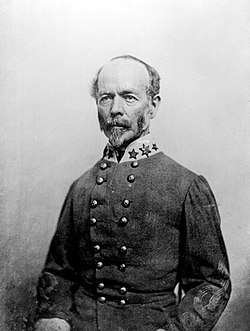 |
| General Joseph E. Johnston |
CHATTANOOGA, March 2, 1863.
His Excellency JEFFERSON DAVIS,
President:
Mr. PRESIDENT: I have just had the honor to receive your letter of the 19th ultimo. I find that it would be difficult to find a successor to General Bragg equal to him in all respects, especially now, when the season of active operations is so near that the successor might not be allowed time to learn well the theater of operations before the enemy's attack, and therefore regret very much that you think that the impaired confidence of the superior officers in his fitness to command makes his removal necessary. I cannot think that troops who seem so full of spirit, and who, their superior officers say, are full of confidence, can doubt much the capacity of their general. Besides a strong belief of his capacity, the injustice he endures from the country induces me to wish that you may find it expedient not to remove General Bragg. Should you do so, however, he will confirm the opinion you express of his disinterested patriotism. I apprehend from some passages of your letter that I may not have fully understood my position here. I thought that it was not intended that I should at any time assume immediate command of either of the three departments, and having so expressed myself in writing to you early in January, without being corrected, I was thus confirmed in my belief. It seems to me that the exercise of such a power, except in rare cases, would operate badly, unless the officer exercising it should be greatly superior to those commanding the departments. Those officers having studdied and kept up with all the military circumstances would be more competent to command at an important juncture than one just arrived. They could not be expected to serve with full zeal and interest if liable to be deprived by my arrival at the last moment of the fruits of long labor. The injustice to the department commanders which might be thus inflicted was suggested to me by your obill creating the office of general-in-chief. It improved that officer to take command of any of our armies whenever he thought proper. This you thought would be unjust to the officer so superseded. The distance between these armies is so great, and each so near the enemy, that one cannot often learn where the need is greatest until it is past. I could not have reached Murfreesborough in time for the battle, if I had attempted to do so after the enemy advanced, but if I had, it would have been a great hazard for me to have taken the command from General Bragg, who had studied and learned the situation. I respectfully suggest that a definition of my official position through General Cooper's office would have a good effect, both for my instruction and that of the department commanders. I trouble you on this subject from anxiety to be useful. If I know my own heart it harbors no other strong wish connected with official position in this war. I take Lieutenant-General Pembertons' silence as proof that the enemy is not making progrees in Mississippi. The newspapers say that they are attempting to open the Yazoo Pass. I was told at Jackson that it was impossible, or if not, easily made so. I telegraphed General Pemberton in relation to it. Our scouts and friends from within the enemy's line report that five Federal divisions have arrived since the battle. Cox's, from Western Virginia, and Sigel's, I suppose from the Potomac, are the last. Rosecrans' force is now estimated at more than double ours, including our large body of irregular cavalry. It is apprehended that it is large enough to enable them, while confronting our army with a superior force, to turn it at a distance by one or both flanks. If compelled to abandon the country beyond the mountains we cannot defend East Tennessee. It has too long a frontier, and cannot support the army. When you desire my presence at any point I will repair to it promptly on the expression of the wish. Suggestions or instructions from you would be very valuable to me, if you could find leisure to give them.
Most respectfully, your obedient servant,
J. E. JOHNSTON.
I have suggested to the honorable Secretary of War that the troops which have been opposed to the lately arrived divisions of the enemy should follow their movement and join General Bragg.*
J. E. J.
* See VOL. XXIII, Part II, p. 656.
Series I., Vol. 52, Part 2, Pages 816-817.
Davis was correct in wanting to remove Bragg. He did not inspire confidence in his subordinate commanders and had shown poor judgment at Stones River, launching attacks against superior positions after the battle was clearly decided. His actions during the Tullahoma campaign underscored his lack of strategic vision. Johnston was proving a vexation in his new position. His refusal to accept field command while complaining of the ill-defined nature of his position must have been a frustration to Davis.
No comments:
Post a Comment